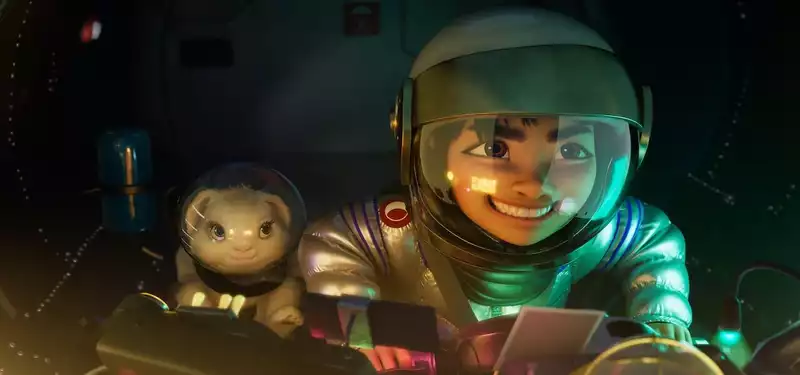Oct 9, 2020
"Over the Moon" Review: Glen Keane's celestial journey is a scenic but bumpy ride
Let's recap the details of this unusual project. It was developed and produced at Shanghai's Pearl Studio, formerly Oriental Dreamworks, which went independent with last year's Abominable. In a still-unusual-but-not-unheard-of arrangement, the Chinese studio outsourced the animation to North America (specifically Sony Pictures Imageworks in Vancouver). Co-producer Netflix is releasing the film as its third original animated feature, following Klaus and The Willoughbys. At the helm is animator Glen Keane, a linchpin of the Disney Renaissance, who won an Oscar for his short Dear Basketball but has never directed a feature before.
In many ways, then, Over the Moon is a case of experienced industry players settling into new roles. That may be why it feels at once highly polished and a little jumbled. The production values are high and the animation is characterful, as we'd expect from a Keane feature. The protagonists are Chinese and sometimes behave accordingly (as the producers have stressed), but the film's drive for cultural authenticity is delivered within a narrative framework that's distinctly Disneyesque, complete with songs and comic sidekicks. The story is engaging and ambitious in scope, but also strangely paced and a little scattershot.
An exposition-laden first act introduces us to an idealized Chinese town, home to young Fei Fei (Cathy Ang, leading a predominantly Asian American voice cast). Her parents enchant her with tales of Chang'e, the folkloric moon deity who pines for her lost love, Hou Yi the archer. The legend, briefly evoked in a gorgeous segment of impressionistic 2d animation - done by Keane himself - continues to play on Fei Fei's imagination even as she grows up and develops a passion for the rational world of science.
A family tragedy prompts Fei Fei to build a rocket and head to the moon in search of Chang'e, accompanied by her peppy stepbrother and pet rabbit. She models her spacecraft on the maglev train, extolling the virtues of Chinese engineering in the process: “Magnetic levitation is the coolest!” The moon itself is a canny choice of setting by Pearl: culturally non-specific, yet in tune with China's growing ambitions in space (Chang'e, after all, is also the name of the country's lunar exploration missions).
But the moon we know from science is not the moon the characters discover when they land. Celine Desrumaux's production design turns up every dial as the team find themselves in a technicolor wonderland populated by sentient candy and other whimsical creatures. It turns out that Chang'e has reinvented herself as a haughty pop star, who holds sway over her lunar dominion by performing banging stadium gigs in imperial robes (designed by fashionista Guo Pei).
Chang'e as diva, embittered by years of lovelessness: this is a bold subversion of the old legend. But rather than explore this ambiguous figure, the film relegates her to the sidelines as Fei Fei and friends are tasked with finding a gift that will help the goddess reunite with Hou Yi. Cue a big change of pace, as the team split up and embark on frenetic adventures.
The moon scenes are well staged and edited; we never feel lost in the topsy-turvy environments. But in narrative terms, they're anarchic. The team are aided and hindered in their missions by ad-hoc characters and magic powers, which make for some zany set pieces (including a low-gravity ping-pong game and a ride with mercenary chickens) but don't cohere into a clear vision for this celestial world. Nor does all this action leave much room for character development, which is mostly condensed into a handful of sweet, forgettable musical numbers.
For all that, the film plays nicely with the symbolism of the moon. In the Earth scenes, the white orb is deployed as an emblem of longing - of emotional distance and connection at the same time. It is cleverly echoed in the stepbrother's beloved ping-pong balls. And just as the moon reflects light, Fei Fei comes to understand her problems by seeing them reflected in Chang'e, in a subtle metaphor that ties the story together. The fable-like elegance of this device comes through in the final act, regardless of how familiar you are with the Chang'e legend.
Throughout, I was fascinated by how Over the Moon toes the line between staying faithful to Chinese culture and interpreting it for a global audience. I'm curious to see how it goes down in China, where audiences are sensitive to cultural appropriation, to judge by reactions to Disney's Mulan remake (admittedly a more purely Hollywood production). As it happens, Netflix doesn't operate in the country, which means Over the Moon will receive a full theatrical release there - and we'll get to measure its popularity with hard box office data.
“Over the Moon” is released October 23 on Netflix.
Director: Glen KeaneProducers: Gennie Rim, Peilin ChouWriter: Audrey WellsCo-director: John KahrsExecutive producers: Janet Yang, Glen Keane, Ruigang Li, Frank Zhu, Thomas HuiSongs by: Christopher Curtis, Marjorie Duffield, Helen ParkScore by: Steven PriceCast: Cathy Ang, Phillipa Soo, Robert G. Chiu, Ken Jeong, John Cho, Ruthie Ann Miles, Margaret Cho, Kimiko Glenn, Artt Butler, Sandra Oh




Post your comment